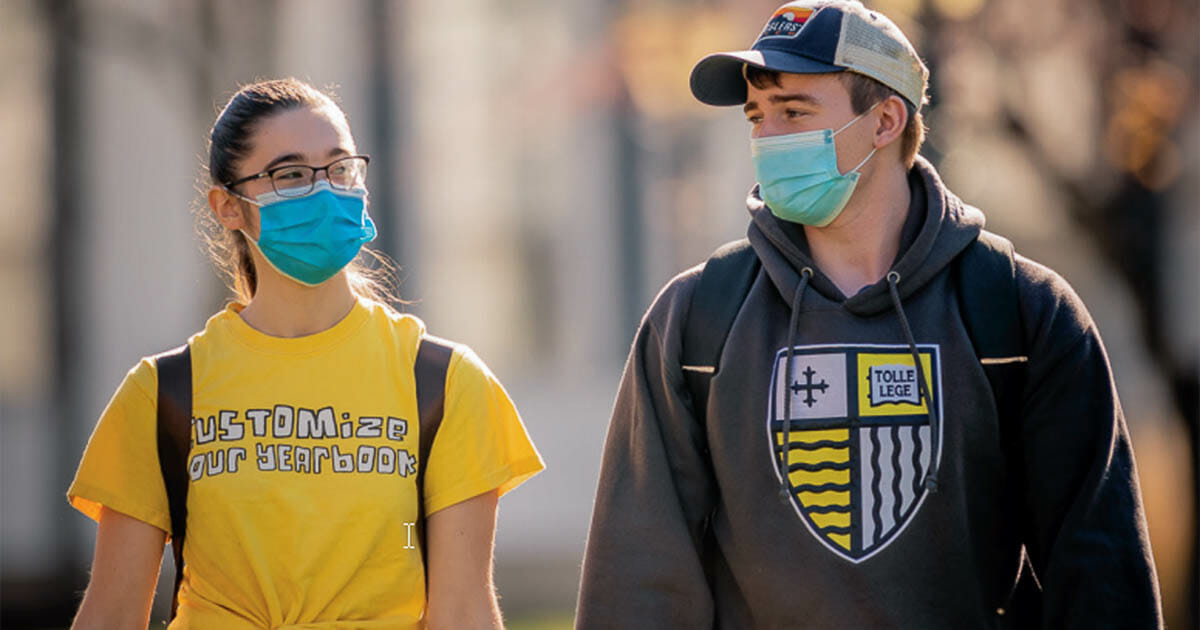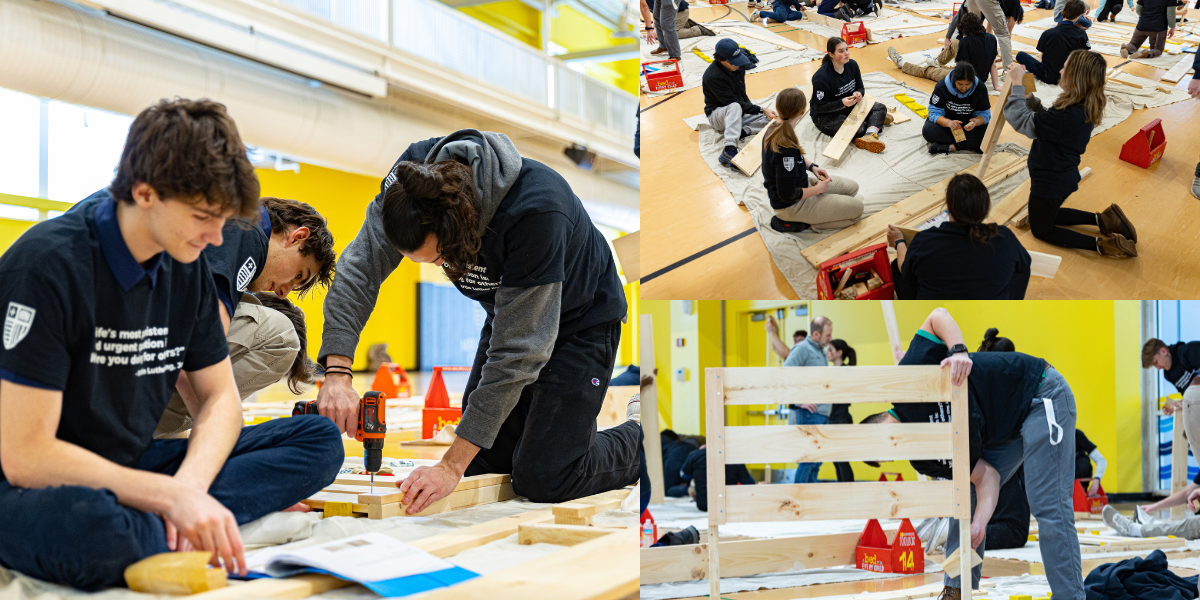During what will go down in history as one of the biggest crises the world has ever faced, the COVID-19 pandemic has created unique obstacles for all higher education institutions, including Merrimack College. No longer able to bring together large groups of people for teaching, researching, living and engaging, Merrimack had to quickly pivot to new modalities earlier this year—and create a forward-looking and thoughtful plan for safely bringing the community back together.
Through careful investments of time and resources—over $18 million to date—Merrimack College responded to the COVID-19 crisis by examining every strength and weakness of the College to produce the best teaching and learning outcomes for our students.
Throughout it all, one priority remained clear: Merrimack would safely reopen its campus and allow for in-person learning and residential living for the fall semester, no matter the effort or cost. “From the start, we recognized our responsibility to deliver to students the high-quality education that Merrimack is known for, regardless of the circumstances,” said President Christopher E. Hopey, Ph.D. “Whether online or on campus, we are committed to delivering on our promises. Throughout this period of disruption, Merrimack has remained Merrimack.”
Pivoting to Online Learning
When academic institutions across the country began closing their campuses and transitioning to online instruction in March, Merrimack was more prepared than most to successfully tackle the digital shift. As an Apple Distinguished School, the College has long been committed to technological innovation—incorporating the latest digital strategies and tools to enhance the teaching and learning processes.
“At the beginning of the pandemic, many schools were scrambling to buy technology for their students and create venues for their faculty to engage with the curriculum virtually,” said Peter Ellard, Ph.D., vice president and dean for student outcomes. “At Merrimack, our students already had iPads in their hands and knew how to use them. Many of our faculty had also already been trained to use learning technology. Those factors allowed us to transition quickly and seamlessly.”
Meanwhile, campus support service professionals stepped up to provide a wide range of remote resources. The Academic Success Center pivoted to virtual one-on-one meetings, resulting in a higher number of engagements compared with pre-COVID rates. The O’Brien Center for Career Development followed suit, helping students navigate an uncertain job market via Zoom meetings and virtual events with employers.
At the same time, campus leadership was hard at work engaging in strategic conversations, sourcing ideas from national and local health agencies, and creating a community-wide continuity and safety plan—amid a fluid situation that, at times, changed every few hours.
“I think those two factors—having the right technology and the right people in place—gave us the ability to tackle remote learning successfully despite the circumstances,” Ellard said.
Reopening Campus
When the spring semester ended in May, President Hopey had already announced that the College would be residential in the fall and was well into the planning stages. As science, technology and public policy continued to evolve, Merrimack focused on being agile—leveraging faculty expertise and community support.
One of the first actions taken was to reach out to the Broad Institute of MIT and Harvard to enroll Merrimack in Safe for School, a robust testing program now in use at 42 area schools.
“From the start, we knew frequent testing was something that would help keep our students and faculty safe when they returned to campus,” President Hopey said. “Broad’s sophisticated testing protocol was designed to help institutions quickly detect the virus and swiftly remove positives from the general population, thereby minimizing exposure to the greater community.”
The testing protocol — which requires initial testing upon return to campus and weekly testing throughout the semester—became a central component of the finalized return-to-campus plan, a four-phased approach to reopening based on recommendations from local, state and national authorities. As the testing protocol was so important for the success of this effort, President Hopey named Dr. Traci Alberti the director of COVID-19 campus surveillance. Alberti has spent the entire semester ensuring all protocols were followed as directed by the state.
As a result, Merrimack conducted over 66,602 tests during the fall semester alone. This effort allowed the College to make swift decisions to remove positive cases from the population before spread and to isolate clusters. Every step of the way, Merrimack has invested heavily in the health and safety of the campus community—building outdoor dining locations, stocking classrooms with hand sanitizer and plexiglass shields, de-densifying classrooms and common areas, and reconfiguring living areas to create small community pods.
With campus reopened, students had the choice of three options for the fall semester:
- Return to campus and take part in a combination of in-person and online courses
- Take virtual courses from an off-campus location
- Take a COVID-19 leave of absence—for one semester or the full year—without penalty
While offering online, in-person and dual options within a single calendar year was a huge logistical undertaking, it was Merrimack’s outstanding educators who really made the effort not only possible, but successful.
“Merrimack College is home to many superstar scholar-teachers who are dedicated to active and experiential learning in primarily face-toface learning environments,” said Kathryn Nielsen, Ph.D., associate vice president for teaching, learning and digital innovation. “To teach online, or simultaneously teach both on campus and online, they had to reimagine and redesign the traditional in-class learning activities, such as mini-lectures, discussions, group- and teambased work, labs, performing arts, presentations and assessments. Our faculty really rose to the challenge.”
Supporting Students – On and Off Campus
Whether students are learning on or off campus (or through a combination of the two) this fall, Merrimack has gone the extra mile to ensure that adequate services and support are available to safely meet their needs.
Increased student financial aid: Knowing the pandemic would intensify financial challenges for students and their families, the College moved to ease the burden on those who would feel it most. To that end, Merrimack invested more than $3 million in financial aid to help offset pandemic-related hardships.
Success coaching: To ensure that all students have someone looking out for them throughout every step of their Merrimack journey, the College introduced success coaching. In the program, each student is assigned a dedicated success coach who serves as a point person, mentor, advocate and navigator. As evidence of its success, first-year students have scheduled more than 1,300 meetings with their coaches in the first semester alone.
“We know that if students have genuine connections, they’re more likely to succeed, they’re less lonely and they feel that they belong,” said Moriah “Mo” John, assistant director of student success in the Holistic Cross-Training and Success Coaching Program. “That’s even more important during a pandemic, when people are more likely to feel isolated. Through success coaching, every student has a caring adult connected to the college who is reaching out and helping them navigate challenges.”
Academic Success Center (ASC): To help offer the additional services during COVID-19, such as student success coaching and increased one-on-one advising appointments, the ASC took an innovative approach: hiring more graduate students.
“Our graduate student employees are great. They’re not teaching classes—their primary role is to help students through the ASC,” Ellard said. “Working alongside our full-time staff, they served a crucial role during a time that required an unprecedented number of resources.”
MACK Tech Bar: From addressing Wi-Fi problems to solving Zoom glitches, the newly introduced MACK Tech Bar has gone into overdrive, providing a new level of tech and online support for students and faculty alike.
Counseling services: To help students navigate the emotional disruption created by COVID-19, Merrimack expanded critical counseling services and launched the BeWell@MC program, which provides 24/7 access to mental health clinicians as well as counseling, crisis intervention services, virtual consultations for parents, and assessments and referrals. The College also initiated on-campus and virtual outreach programs led by students, faculty and staff. No matter whether a student is living on campus or learning remotely, help is just a phone call away.
Activate Program: Periods of disruption can be especially difficult for neuro-diverse students who thrive in structured environments. The Activate Program is helping Merrimack students on the autism spectrum tackle college life and the challenges created by the pandemic through mentorship and one-on-one meetings.
Student Emergency Fund: Some needs created by COVID-19 are more practical in nature—from Wi-Fi access to food or rent. In response, Merrimack created the Student Emergency Fund to assist students facing additional financial hurdles due to COVID-19. To date, the College has provided nearly $1.2M in additional aid and over $120K in emergency aid.
Navigating an Uncertain Job Market
While the pandemic created a variety of immediate challenges, Merrimack has continued to prepare for the future—on behalf of our students and the institution. Despite hurdles in the current job market, the College remains committed to preparing students for successful careers after graduation.
At the O’Brien Center for Career Development, staff have collaborated with different technology partners to help students on their career journey, whether they’re learning online or in person. Through Burning Glass, students can explore labor market data that show helpful information, like who’s hiring and the specific skills they’re seeking. With LinkedIn Learning, students can supplement and complement classroom learning with additional training and certification— in subjects ranging from Microsoft Excel to diversity awareness—and earn skill proficiency badges that can be added to their LinkedIn profiles.
To help students better prepare for the current job market, the O’Brien Center is also offering virtual-specific coaching on topics such as Zoom interview etiquette. Remote strategies have also been embraced in networking efforts.
This semester, virtual career fairs have helped students connect with potential employers in exciting new ways.
“One of the biggest challenges we’ve faced during the pandemic is helping students pivot their plans toward the jobs that are currently available,” said Michaele Morrow, Ph.D., associate vice president, career advising and professional development. “Thanks to our digital resources, students have tools right at their fingertips that help them explore new career possibilities.”
Preparing for the Future
Though a number of Merrimack’s recent changes have been triggered by COVID-19, some innovations are likely here to stay—from Zoom meetings to increased digital support resources. Ultimately, the pandemic has served as a catalyst for ongoing digital and organizational transformation, spurring existing efforts to embrace the latest digital strategies and technology, which will serve the institution for years to come.
While 2020 has not been the year anyone expected, steering the institution toward financial stability, maintaining faculty and staff ranks, and providing students with the ability to continue their studies remain the core missions of the institution. Merrimack’s ability to do this and more underscores an important principle: Warriors are able to surmount any obstacle, together.


